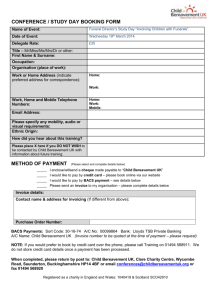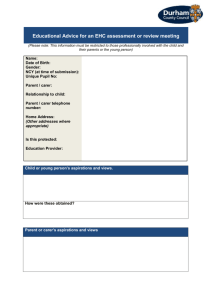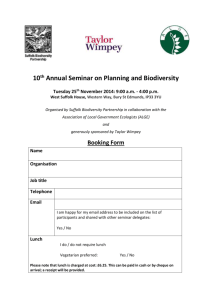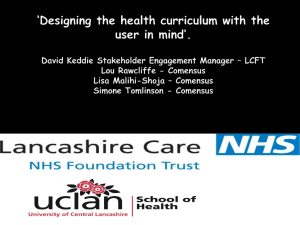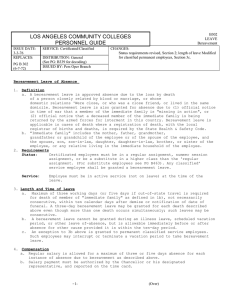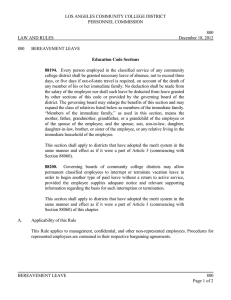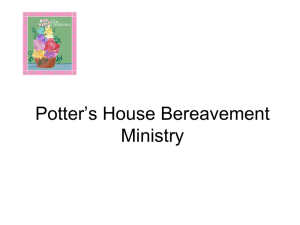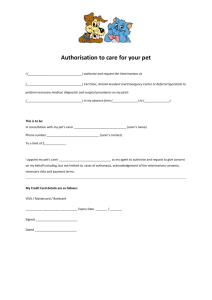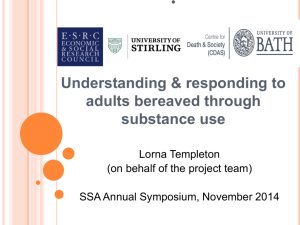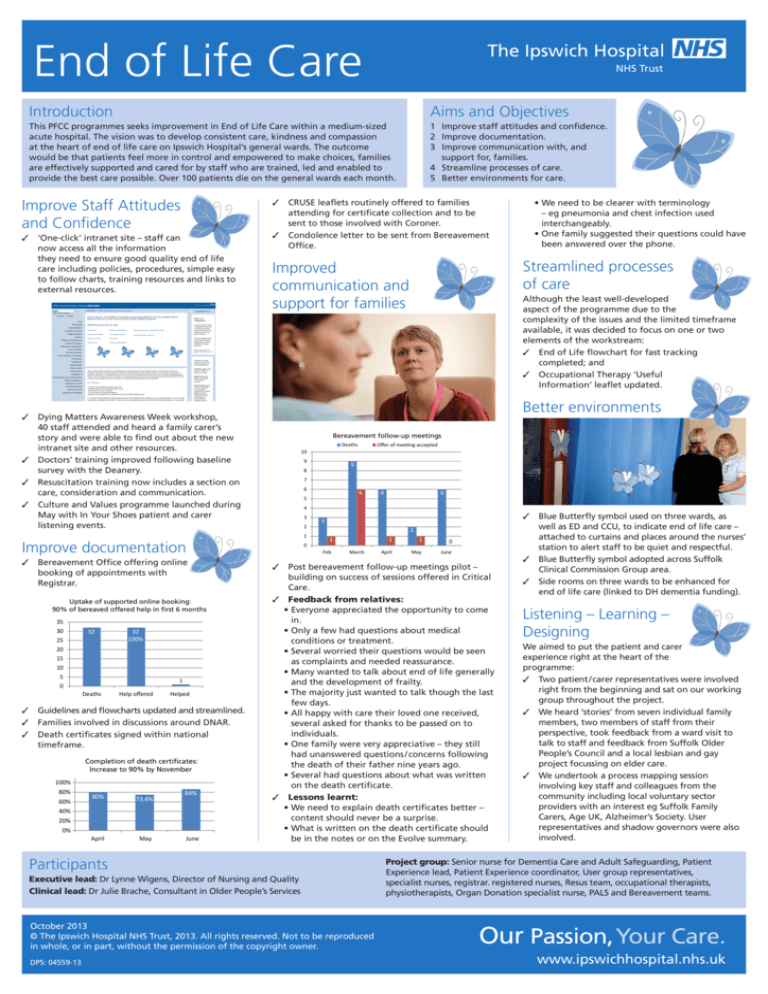
End of Life Care
Introduction
Aims and Objectives
This PFCC programmes seeks improvement in End of Life Care within a medium-sized
acute hospital. The vision was to develop consistent care, kindness and compassion
at the heart of end of life care on Ipswich Hospital’s general wards. The outcome
would be that patients feel more in control and empowered to make choices, families
are effectively supported and cared for by staff who are trained, led and enabled to
provide the best care possible. Over 100 patients die on the general wards each month.
1Improve staff attitudes and confidence.
2 Improve documentation.
3Improve communication with, and
support for, families.
4 Streamline processes of care.
5 Better environments for care.
Improve Staff Attitudes
and Confidence
‘One-click’ intranet site – staff can
now access all the information
they need to ensure good quality end of life
care including policies, procedures, simple easy
to follow charts, training resources and links to
external resources.
CRUSE leaflets routinely offered to families
attending for certificate collection and to be
sent to those involved with Coroner.
Condolence letter to be sent from Bereavement
Office.
Improved
communication and
support for families
Streamlined processes
of care
Bereavement follow-up meetings
Deaths
35
30
32
25
32
100%
20
15
10
5
1
0
Deaths
Help offered
Helped
Guidelines and flowcharts updated and streamlined.
Families involved in discussions around DNAR.
Death certificates signed within national
timeframe.
Completion of death certificates:
Increase to 90% by November
100%
80%
60%
80%
73.4%
April
May
84%
40%
20%
0%
June
Offer of meeting accepted
10
9
9
8
7
6
6
5
3
6
2
1
0
3
2
1
Feb
March
1
1
0
April
May
June
Post bereavement follow-up meetings pilot –
building on success of sessions offered in Critical
Care.
Feedback from relatives:
• Everyone appreciated the opportunity to come
in.
• Only a few had questions about medical
conditions or treatment.
• Several worried their questions would be seen
as complaints and needed reassurance.
• Many wanted to talk about end of life generally
and the development of frailty.
• The majority just wanted to talk though the last
few days.
• All happy with care their loved one received,
several asked for thanks to be passed on to
individuals.
• One family were very appreciative – they still
had unanswered questions / concerns following
the death of their father nine years ago.
• Several had questions about what was written
on the death certificate.
Lessons learnt:
• We need to explain death certificates better –
content should never be a surprise.
• What is written on the death certificate should
be in the notes or on the Evolve summary.
Participants
Executive lead: Dr Lynne Wigens, Director of Nursing and Quality
Clinical lead: Dr Julie Brache, Consultant in Older People’s Services
October 2013
© The Ipswich Hospital NHS Trust, 2013. All rights reserved. Not to be reproduced
in whole, or in part, without the permission of the copyright owner.
DPS: 04559-13
6
4
Improve documentation
Uptake of supported online booking:
90% of bereaved offered help in first 6 months
Although the least well-developed
aspect of the programme due to the
complexity of the issues and the limited timeframe
available, it was decided to focus on one or two
elements of the workstream:
End of Life flowchart for fast tracking
completed; and
Occupational Therapy ‘Useful
Information’ leaflet updated.
Better environments
Dying Matters Awareness Week workshop,
40 staff attended and heard a family carer’s
story and were able to find out about the new
intranet site and other resources.
Doctors’ training improved following baseline
survey with the Deanery.
Resuscitation training now includes a section on
care, consideration and communication.
Culture and Values programme launched during
May with In Your Shoes patient and carer
listening events.
Bereavement Office offering online
booking of appointments with
Registrar.
• We need to be clearer with terminology
– eg pneumonia and chest infection used
interchangeably.
• One family suggested their questions could have
been answered over the phone.
Blue Butterfly symbol used on three wards, as
well as ED and CCU, to indicate end of life care –
attached to curtains and places around the nurses’
station to alert staff to be quiet and respectful.
Blue Butterfly symbol adopted across Suffolk
Clinical Commission Group area.
Side rooms on three wards to be enhanced for
end of life care (linked to DH dementia funding).
Listening – Learning –
Designing
We aimed to put the patient and carer
experience right at the heart of the
programme:
Two patient / carer representatives were involved
right from the beginning and sat on our working
group throughout the project.
We heard ‘stories’ from seven individual family
members, two members of staff from their
perspective, took feedback from a ward visit to
talk to staff and feedback from Suffolk Older
People’s Council and a local lesbian and gay
project focussing on elder care.
We undertook a process mapping session
involving key staff and colleagues from the
community including local voluntary sector
providers with an interest eg Suffolk Family
Carers, Age UK, Alzheimer’s Society. User
representatives and shadow governors were also
involved.
Project group: Senior nurse for Dementia Care and Adult Safeguarding, Patient
Experience lead, Patient Experience coordinator, User group representatives,
specialist nurses, registrar. registered nurses, Resus team, occupational therapists,
physiotherapists, Organ Donation specialist nurse, PALS and Bereavement teams.
Our Passion, Your Care.
www.ipswichhospital.nhs.uk

